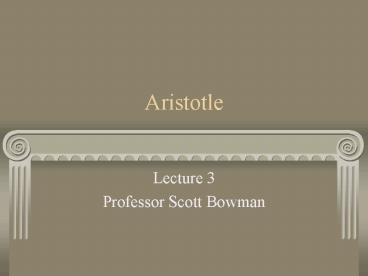Aristotle PowerPoint PPT Presentation
1 / 21
Title: Aristotle
1
Aristotle
- Lecture 3
- Professor Scott Bowman
2
Aristotle
A student of ancient Greek philosopher Plato,
Aristotle shared his teachers reverence for
human knowledge but revised many of Platos ideas
by emphasizing methods rooted in observation and
experience. Aristotle surveyed and systematized
nearly all the extant branches of knowledge and
provided the first ordered accounts of biology,
psychology, physics, and literary theory. In
addition, Aristotle invented the field known as
formal logic, pioneered zoology, and addressed
virtually every major philosophical problem known
during his time. Known to medieval intellectuals
as simply the Philosopher, Aristotle is
possibly the greatest thinker in Western history,
and historically, perhaps the single greatest
influence on Western intellectual development.
3
Criticised Plato
Transcendent World
Man 3 Form of Man
Man 1
Man 2
Real world
4
Criticised Plato
Third higher man
Transcendent World
Man 3 Form of Man
Man 1
Man 2
Real world
5
Criticised Plato
Higher still man
Third higher man
Transcendent World
Man 3 Form of Man
Man 1
Man 2
INFINITE REGRESS
Real world
6
Counter argument to the 3rd Man
- The form of man is not a man
- For example personhood is not a person
7
The problem of chorismos
- Chorismos mean separation
- Aristotle did not believe in the forms being
separate from the real world - Aristotle did not believe in a transcendent world
- Aristotle sees a big problem in the link between
the real and transcendent world. How can things
be from Forms?
8
Aristotle
- Aristotle believes in Forms but not in a
transcendent world. - Aristotle believes that the Forms are in the real
world - They are the essence of what things are.
- Aristotle rejects Transcendent Forms in favour of
Immanent Forms
9
Aristotle Matter and Form
- Everything has matter and form
- Matter is the concreteness of a thing
- Form is the essence or whatness of a thing
- Matter does not exist without form.
- Structural law of formation
- Every thing in the natural world has both form
and matter there are no examples of unformed
matter or matterless form.
10
Clay
11
Matter
Matter is a relatively undetermined factor which
receives completer determination by structural
law of formation
Major difference with Plato Plato says that
form exists without matter Aristotle says this
cannot be.
12
Aristotle and God
- God is pure form
- The unmoved mover
- Only matter can change so god cannot change
13
Realism
- Believe in the Forms
14
Nominalism
- Forms do not exist they are simply words to
group things together
15
Ockhams Razor
- Entities are not multiplied without necessity.
- William of Ockham
16
Conceptualism
- A compromise
- Forms do exist but only in the mind
17
Aristotles 4 Causes or principlesthese are what
make up a thing or explain it
- Material cause
- Formal cause
- Efficient cause
- Final cause
18
Material Cause
- The matter that makes up the thing
19
Formal cause
- The essence or whatness of a thing
20
Efficient Cause
- The moving cause
- The thing that brings the thing into being
21
Final Cause
- The end or purpose of a thing

